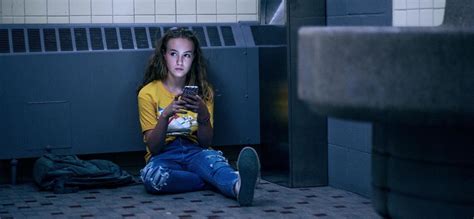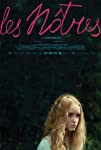Eye For Film >> Movies >> Les Nôtres (2020) Film Review
Les Nôtres
Reviewed by: Jennie Kermode

When first we glimpse Magalie (Emilie Bierre) she's sitting on the bed with her back to us, a sheet drawn up across her chest, her face half turned. The ochre hues of the room tell us that it's not her own. Viewers old enough to remember the Seventies may note a resemblance to that decade's sleazy art photography. Something about the light, however, recalls the work of Johannes Vermeer, and she has the same enigmatic gaze as many of his young female subjects. Read one way, she is sullen, withdrawn; read another, she is on the brink of spitting fire.
Magalie lives in the sort of quiet little Quebecois town where nothing much ever happens, or if it does, everyone is careful to forget about it. One thing the townspeople are currently struggling to forget is the accident at the factory which claimed the life of her father. It's now up to her mother (Marianne Farley) to pull herself together and support the family; she's grateful for the kindness of the mayor (Paul Doucet), who has given her a promotion and made it his personal business to see that everything's all right. And perhaps everything really felt as if it could be all right, for a while, until Magalie fainted in dance class and it emerged that she was pregnant.

"Did somebody do something to you?" her mother asks and she says "No," but it's not clear that either of them really understands the question. Those critics convinced that the whole point of the film is to uncover the identity of the father don't understand it either. Magalie doesn't want to talk. She's not about to submit to tests. This shouldn't be her problem. But she has upset the order of this quiet little town, and silence cannot protect her from its wrath. At school she's called a slut. Racist insults are hurled at her best friend Manu (Léon Diconca Pelletier), whom people assume must be responsible. Her relationship with her mother begins to break down.
Magalie is 13, just old enough for people to see her slender figure and golden hair as some sort of enticement or threat, but when the camera catches here in a different way, she looks very, very young indeed, and frightened, barely holding it together.
The basic premise of this film may be nothing new but the handling of it is exceptional. Perhaps, as director Jeanne Leblanc has suggested, a woman's perspective brings something different to it. We meet the man who has done this to Magalie but it is never his story; perhaps no version of it ever really was. Bierre is an extraordinary lead. She presents us with a heroine who encompasses both child and young adult, victim and protector and perhaps, in desperation, something much darker. Magalie is a character who commands respect even as we recognise her awful vulnerability and see, in their only full scene together, how depressingly easy it has been for her abuser to exploit the same drive for empowerment that is keeping her going.
Tangled up in this are numerous other threads. Adult women in the town react in differently discomfited ways to Magalie's change of status. Manu's white adoptive parents begin to question his character and blame his ethnicity. A social worker tries to help but it easily pushed aside. A greater horror lurks behind it all: if the truth does come out, will anything change, or will it, too, prove too inconvenient to be heeded?
The darkness gathering towards the end of the film recalls Nabokov's original Lolita: an awful bleakness that everybody strives to forget. In the final shot, Magalie sits on the back seat of a car. As it starts to move the camera stays on her face and we see it slowly age and harden, that sheen of innocence lost, adulthood finally broached. How has this been allowed to happen? She is looking at us.
Reviewed on: 18 Jun 2021















